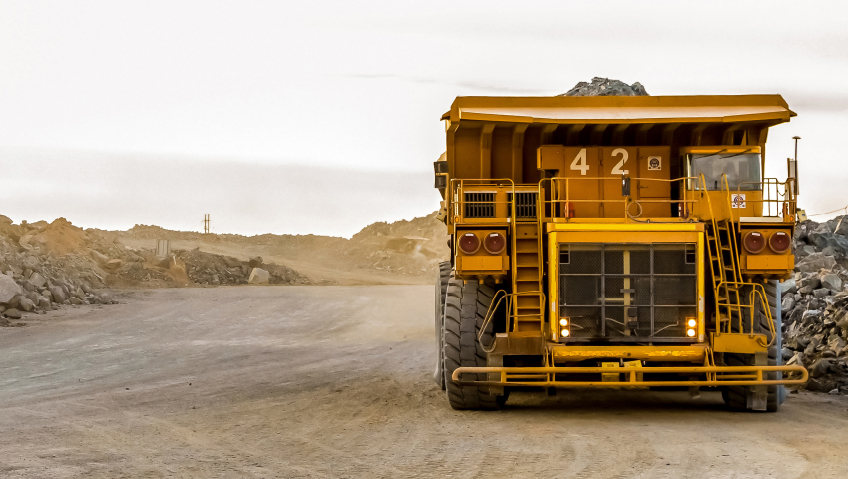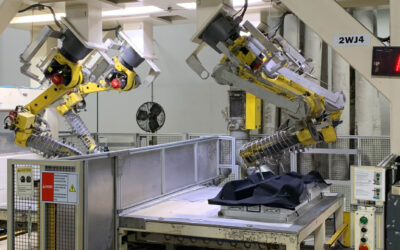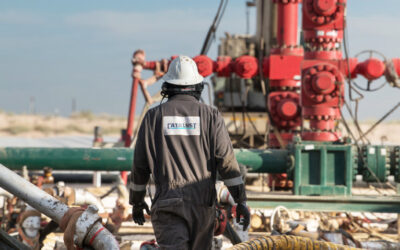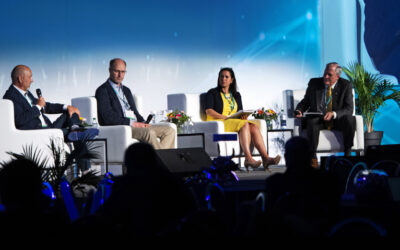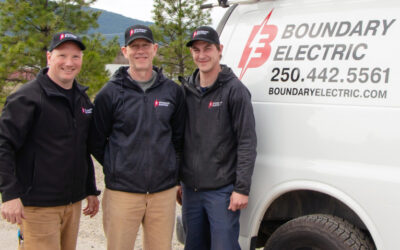It’s known as the city that never sleeps, and with countless types of businesses, tourists, residents, restaurants and entertainment, New York City produces a lot of trash at all hours of the day and night. Donna Chiaia helps keep the city she loves clean and green through Classic Recycling New York, her multi-generational family business that she proudly owns and runs with her sister and daughter, and which boasts more than 50 years of experience.
Brooklyn-born and a “New Yorker at heart,” Chiaia grew up in the sanitation business, immersed in the environment since childhood and arriving at her destination via her father.
“He started it over 54 years ago,” she says. “We’ve been in the industry in New York for all these years. I was literally seven years old sitting in the truck.”
After graduating from Columbia University, Chiaia started working for her dad before taking over with her sister more than 35 years ago. A member of SWANA (Solid Waste Association of North America), the company has a strong focus on equity and inclusion, and now proudly counts Chiaia’s daughter as a team member as well.
“My daughter graduated with her MBA and worked in New York City in fashion,” Chiaia says. “I was able to turn her from fashion to waste management.”
In a historically male-led industry, Chiaia is proud to employ women in the industry, with the older generation teaching the younger one valuable skills and insights gained from years of experience. “I think the consistency and stability of having the continuity is good. I’m happy I am able to teach her and be a good role model for her, and that she’s in the business as well,” Chiaia says. “And my daughter also brings fresh ideas and perspectives.”
Even though the company has earned credibility without certification and has been women-owned for over 35 years, Classic Recycling recently went through the process of becoming a certified WBE (Women Business Enterprise). “Certification validates the customers’ and vendors’ decisions to work with the company, giving credibility in a country focused on equity and inclusion. Many of our customers and vendors appreciate that not only can they rely on our service and professionalism, they can also show that they are helping to advance their own commitment to inclusion,” Chiaia says.
“I think becoming certified highlights the importance of promoting women entrepreneurship, especially in an industry where the trucking, hauling and carting sectors tend to be male-dominated. It’s also nice that the NYC Department of Sanitation has had three women as commissioners, including the current commissioner, which is great.”
And although Chiaia has years of experience in the industry, at times she’s found it frustrating to have to prove her knowledge. As an example, when recently purchasing lower-emission vehicles, one truck company she spoke with didn’t think she’d understand or be so knowledgeable about the industry and field.
“I found that a little annoying as well as amusing,” she says. “They couldn’t believe I knew about emissions and truck standards, so that was funny. I was speaking about greenhouse gas emissions and electric trucks and what we want in our equipment and safety criteria I needed and he was quite impressed.”
To that end, Chiaia also hopes she can lead by example and bring more women into the industry, inspiring them to become sanitation drivers or helpers and members of Local Union 813.
Her decades in the industry also help with the challenges of running a recycling business in New York City, which can be numerous and daunting. “New York City is intense, unique and one of the most intricate in the world, so it’s quite an experience to run trucking here,” she says. “There are a lot of moving parts to it, it takes a lot of experience, and the one thing we have is experience.”
It’s also very congested and crowded with residents, commuters, and lots of cars. “There’s a lot of competition for the streets with traffic and deliveries, and now with outdoor dining because of COVID—which is wonderful because it’s keeping New York open and alive and helping the economy—there’s also another set of challenges.” Restaurants having tables outside means streets are getting narrower which presents a competition for space and a challenge for where to put rubbish and navigate the maze.
It takes a lot of thoughtfulness to operate in this environment, but it is a challenge that Chiaia is more than qualified to handle.
“We’ve always had to be aware of and in tune with the city’s narrow streets and tourists,” she says. “It’s true that it’s the city that never sleeps. Trucks run at night. You have different bars closing at 2am, 3 am, 4am. You have to be able to logistically and carefully service customers with a strong focus on service and safety.”
Classic Recycling’s expertise focuses on Manhattan. “Urban areas by definition are congested; now layer on the Christmas Tree lighting at Rockefeller Center, the Macy’s Thanksgiving Day Parade, and all the other major parades that draw people from around the world, and the world leaders and their motorcades that come for the United Nations. Waste removal in other places doesn’t have to plan for things like this.”
Chiaia’s experience in servicing the city means a good chance to transition to the competitive DSNY CWZ (Commercial Waste Zones) program, created to provide efficient and safe waste collection while advancing the Green New Deal and zero waste goals.
“It’s a great program trying to lower greenhouse gas emissions to help the environment by reducing the amount of trucks on the road through consolidating,” Chiaia says. “The opportunity the city is offering with the Commercial Waste Zone is exciting and with our experience, we’re hoping to become part of that. We have relationships with our customers and already service customers within the key zones, so we’re very familiar with how to safely service and operate a business in these unique districts.”
It helps that Chiaia’s commitment to sustainability and the environment is already a huge part of Classic Recycling’s mandate and one they’ve been utilizing from the start. The company has purchased very low-emission trucks, and has looked into purchasing electric trucks, but there are some logistical hurdles, she says, including slower charging and supply chain issues.
Along with greener equipment, Classic Recycling works with customers to get bags off the streets with toters for cleanliness and toter straps to avoid vermin; takes less waste to landfills to lower the amount of greenhouse gas emissions; and employs other waste diversions such as mattress recycling, dealing with organizations for furniture donations, and the reuse programs.
“We’re getting our customers to compost,” Chiaia adds. “Organic waste compliance has been a little bit of a challenge, but we’re getting there.”
The company is also offering customers solar compactors to put garbage out in a cleaner way, avoiding piled-up bags, which lends itself to a greener community with fewer odors.
“We’re about educating customers, offering a sustainability plan and greener equipment,” says Chiaia. “This means reuse, reduce, recycle and donate to help divert waste from landfills to lower greenhouse carbon emissions that contribute to climate change.”
While some of these challenges may seem overwhelming, Chiaia takes it all in stride, like any true New Yorker, particularly one who has built up years of business skills and practice.
“[What drives us is] the sense of servicing our customers as well as always maintaining the highest level of safety for pedestrians, the community, and our employees,” she says. “It’s more or less trying to always have experience navigating through the different changes and challenges, and I think that experience is the key.”
The fact that Classic Recycling is a family business offering excellent customer service is a point of pride for Chiaia: Any customer can call the company and one of us will answer the phone. “They have our cell phone numbers,” she says. “We’re committed.”
Although obstacles through the years have been numerous, including 9/11, crime, and the Great Recession, COVID, which Chiaia refers to as the “biggest dislocation,” has hit the city very hard economically.
“It had a big impact on our customer base and was tough for us to navigate as a company,” she says. “Customers who stayed open knew that they could rely on our professionalism, and through our strategic decision making we adapted and excelled and retained the same employees with lots of experience.”
Chiaia has a number of admirable goals she hopes to meet over the next few years including continuing to update and modernize her equipment with the lowest greenhouse gas emissions, converting to electric trucks, further incentivizing recycling, improving route optimization, concentrating on overall environmental health and, of course, being awarded Zones in the NYC Commercial Waste Zone Program
“We look to reduce truck traffic to lower air pollution and improve quality of life,” she adds. “By reducing the amount of garbage bags on the city streets we’ll help create a better and cleaner community. It’s all about having a zero-waste mindset.”
By joining together different generations, the family’s collective knowledge becomes a greater strength, she adds, leading to success through customer service, hard work, responsibility and high values. “This is what we do. Our family pride fosters reliable work ethics,” says Chiaia. “Our commitment to business consistency and stability formed our framework, and this experience is central to our company’s past and future success.”
The company’s multi-generational experience has created a dynasty of devotion and loyalty. “We’ve overcome the biggest dislocations in history, stayed in our business, serviced our customers, and worked every single day through the pandemic,” Chiaia says. “It was a big impact on everything, but with strategic decision making and experience we were able to do our jobs and keep our operation safe.”







